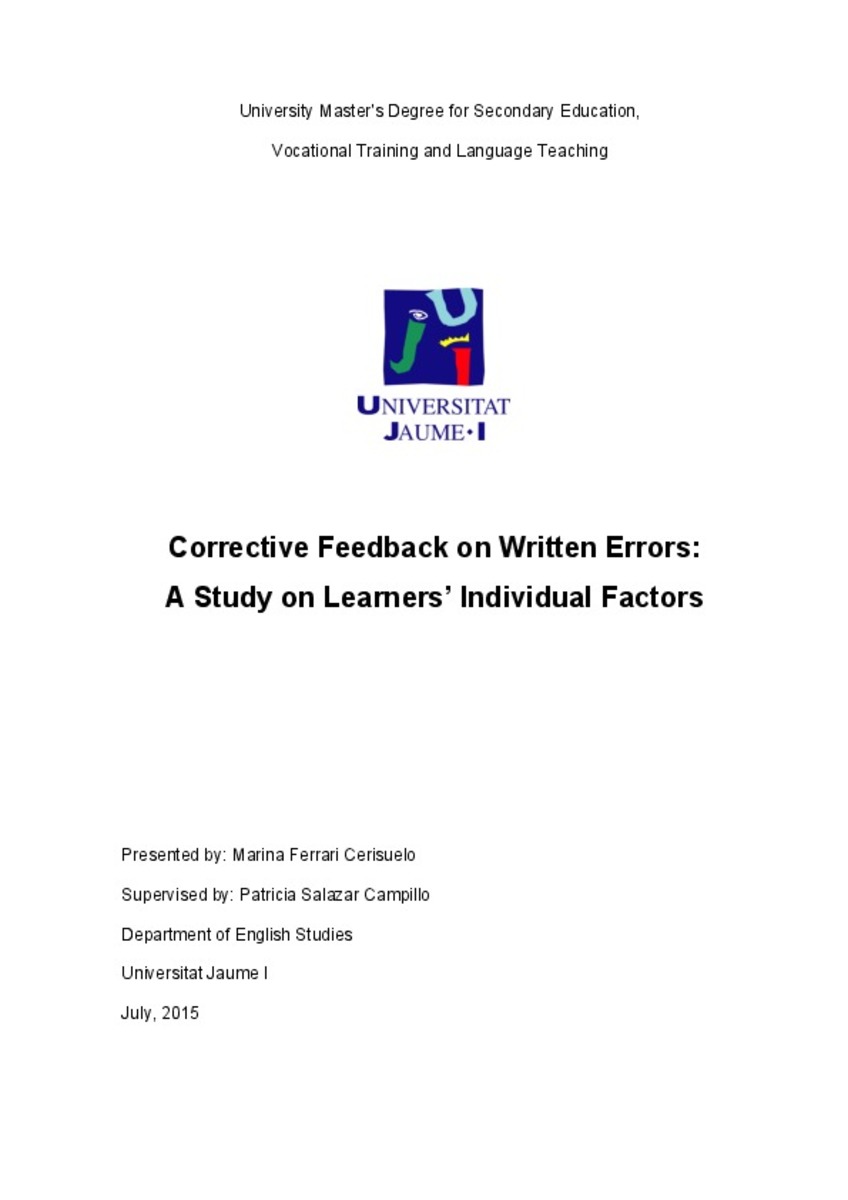Mostrar el registro sencillo del ítem
Corrective feedback on written errors: a study on learners’ individual factors
| dc.contributor | Salazar Campillo, Patricia | |
| dc.contributor | Universitat Jaume I. Departament d'Estudis Anglesos | |
| dc.contributor.author | Ferrari Cerisuelo, Marina | |
| dc.date.accessioned | 2015-11-05T12:55:31Z | |
| dc.date.available | 2015-11-05T12:55:31Z | |
| dc.date.issued | 2015-07-14 | |
| dc.identifier.uri | http://hdl.handle.net/10234/138805 | |
| dc.description | Treball Final del Màster Universitari en Professor/a d'Educació Secundària Obligatòria i Batxillerat, Formació Professional i Ensenyaments d'Idiomes. Codi: SAP419. Curs acadèmic 2014-2015 | ca_CA |
| dc.description.abstract | During the past decades, the importance of corrective feedback (CF, henceforth) in foreign language acquisition has been widely studied. Although there are no conclusive studies, this paper defends the relevance of high-quality written CF in the teaching-learning process. Although factors influencing the effectiveness of CF are still not clear, Sheen (2011) argues that apart from linguistic and contextual factors, students’ individual factors should also be taken into consideration. Therefore, for the purposes of this paper, “high-quality” feedback is considered as the one taking students’ individual factors into account in order to maximise its benefits. The objective of this paper is to verify whether or not foreign language (FL) teachers take learners’ individual factors into account when providing written CF. The study has been carried out in Ágora Lledó International School in Castellón (Spain). This centre has been chosen because their educational project is based on the latest pedagogical tendencies. Hence, analysing the quality of teachers’ feedback in this context is highly revealing. In order to do so, 198 writings from classrooms with different profiles have been analysed. We have focused the study on two class groups. The first group is one from 1st year of Secondary Compulsory Education and the second one is studying 2nd year of national Baccalaureate. Three factors have been taken into account: age, language proficiency and interest in the subject. The main conclusion is that age is taken into account when providing CF, which is the main difference between the two class groups. Nevertheless, other individual factors such as students’ proficiency in English and their interest in the subject are not taken into account although scholars recommend to do so (Sheen, 2011; Pawlaw, 2012). Therefore, in order to maximise feedback effect on students, teachers should take into consideration learners’ individual factors and this is why a pedagogical proposal is presented at the end of this paper. | ca_CA |
| dc.format.extent | 43 p. | ca_CA |
| dc.format.mimetype | application/pdf | ca_CA |
| dc.language.iso | eng | ca_CA |
| dc.publisher | Universitat Jaume I | ca_CA |
| dc.rights | Attribution-NonCommercial-ShareAlike 4.0 Spain | * |
| dc.rights.uri | http://creativecommons.org/licenses/by-nc-sa/4.0/ | * |
| dc.subject | Màster Universitari en Professor/a d'Educació Secundària Obligatòria i Batxillerat, Formació Professional i Ensenyaments d'Idiomes | ca_CA |
| dc.subject | Máster Universitario en Profesor/a de Educación Secundaria Obligatoria y Bachillerato, Formación Profesional y Enseñanzas de Idiomas | ca_CA |
| dc.subject | Master's Degree in Secondary Education, Vocational Training and Language Teaching | ca_CA |
| dc.title | Corrective feedback on written errors: a study on learners’ individual factors | ca_CA |
| dc.type | info:eu-repo/semantics/masterThesis | ca_CA |
| dc.educationLevel | Estudios de Postgrado | ca_CA |
| dc.rights.accessRights | info:eu-repo/semantics/openAccess | ca_CA |
Ficheros en el ítem
Este ítem aparece en la(s) siguiente(s) colección(ones)
-
TFM: Màster Universitari en Professor/a d'Educació Secundària Obligatòria i Batxillerat, Formació Professional i Ensenyaments d'Idiomes [1230]
SAP118, SAP119, SAP128, SAP129, SAP138, SAP139, SAP218, SAP219, SAP228,SAP229, SAP238, SAP239, SAP319, SAP419, SAP429, SAP509, SAP909, SAP709, SAP809








